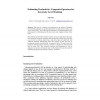70 search results - page 1 / 14 » Predicting task execution time on handheld devices using the... |
CHI
2005
ACM
14 years 5 months ago
2005
ACM
The Keystroke-Level Model (KLM) has been shown to predict skilled use of desktop systems, but has not been validated on a handheld device that uses a stylus instead of a keyboard....
HCI
2009
13 years 2 months ago
2009
Task time is a measure of productivity in an interface. Keystroke Level Modeling (KLM) can predict experienced user task time to within 10 to 30% of actual times. One of the bigges...
CHI
2006
ACM
14 years 5 months ago
2006
ACM
Comparison of model prediction against observed data is an investigative step used in cognitive modeling research for human-computer interaction. In this paper we describe compari...
CHI
2007
ACM
14 years 5 months ago
2007
ACM
The design of applications using mobile devices needs a different quality assessment than those known for desktop applications. Of the many aspects that have to be taken into acco...
EMSOFT
2005
Springer
13 years 10 months ago
2005
Springer
We present AutoDVS, a dynamic voltage scaling (DVS) system for hand-held computers. Unlike extant DVS systems, AutoDVS distinguishes common, course-grain, program behavior and cou...


